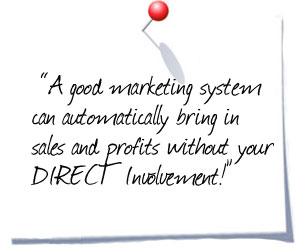How to Work Less Whilst Having Your Website Sell More
Most people don’t realize that you can make more money by working less. How? By using the Pareto Law, otherwise known as the 80:20 Rule.
According to the Pareto Law 20 percent of your work produces 80 percent of your results. This is something that applies to many areas of your life and business. For example:
20 percent of your customers produce 80 percent of your profits.
You live in 20% of your house 80 percent of the time that you are at home.
80 percent of your computer crashes were caused by 20 percent of your programs.
You spend 80 percent of your ‘friends time’ with the same 20 percent of your friends.
Often this is also how it works with your website. 80 percent of your visitors only view 20 percent of your site and 80 percent of your sales will come from 20 percent of your visitors. Knowing this, you can change the way you work and make more money.
If you know visitors are gravitating towards 20 percent of your site, find out where they are. Look for ways to improve those pages. Use online analytic programs such as Google Analytics (this is something that we set up free of charge for our clients) to gather information about your website’s visitors.
The key factor in making more money from your website will be improving these pages so that they get your visitor to buy your product or service. Remember that these pages will be seen five times more than the other pages by the majority of your visitors.
If the most viewed pages do not include your sales page, make sure those pages direct your visitors to the pages that do sell your products or services. But if they should be your sales pages, try to find ways to improve your copy.
All of the pages can be improved with better headlines and by providing more or better information. Sales pages should include contact details and emphasize the benefits of your products or services. One of the best things you can do to improve your page is to add a video.
Every improvement offers the opportunity of a five-fold increase in the performance of your website and you will only need to work on 20 percent of your website to achieve those results.
Six Top Tips For Choosing A Business Name
Inspiration has hit and you want to branch out, you want to begin a new company and make money on your own. However, one of the keys to success is a unique business name – how do you choose that successful business name? Here is some advice to get you started.
Top tip #1: Don’t limit your options
Having an eye-catching and memorable name is of ultimate importance in today’s fast-paced and highly competitive world; however, you must consider the longevity of the brand. For example, you may wish to enter new sectors of your chosen market and re-launching may be difficult if your company name is too descriptive of the sector you are in. A consumer is less likely to associate a computer software brand name with mobile phones.
Top tip #2: Consider various markets
The power of the internet has brought with it a vast amount of globalization, which means that you must take into consideration the fact that you could sell at an international level. Just as it is important to identify a suitable name that has longevity, you must also determine whether or not the name can be translated correctly. There have been incidences where companies find themselves facing consumers who are expecting different services because the name was translated to mean something entirely different to what is actually on offer.
Top tip #3: Stick to the law
This is rarely known by beginners, but there are certain laws that apply to which names can be used and which names cannot be used when setting up a company. It is vital that you are aware of and stick to these regulations, especially if you are opening a limited company. Never make claims you are not able to keep and always avoid sounding like an already existing business. Check with the national registrar of companies to ascertain what restrictions exist in your country of activity.
Top tip #4: Branding
Branding is a vital aspect of running a successful online business, so it is important that your name is both relevant and simple and that all domains are similar for consumer convenience. Nowadays it is recommended that (e.g.) your .com and .co.uk domains are similar (preferably the same), and that they match your social media handles, in order to better promote branding and online presence.
Top tip #5: Spelling
Spelling is as important in the workplace as it was back in your school days. When opening a company and choosing a business name, it is imperative that you consider whether or not your company name can be easily misspelled. If it can, then it will be and it is more than likely that it will be missed in searches. Furthermore, many people may discover your company via word of mouth, so even if your SEO is appropriate a misspelling could lead to a loss of business.
Top tip #6: Keep it simple
While you may think that a long-winded name is more attractive, it generally isn’t. Apple, Google, Dell, Samsung – these one-word big hitters are more successful because they are short, sharp and easy to remember. You should also consider that this is the age of social media sharing and shorter business names make for easier sharing opportunities – a name such as Apple is far more preferable when sending a Twitter tweet as it uses less of the 140 character limit and is far more re-tweetable.
How to Select Your SEO Provider
Search Engine Optimisation (SEO) can be an important and beneficial investment for your business. But, as more and more entities offer an SEO service it can be difficult to select an ethical SEO provider that will actually deliver positive results. Different providers have different ideas and methods and as a result, some website owners are left with more questions than answers. Here are a few points that may be of help to you.
of help to you.
Unrealistic promises – Do not believe an SEO business that guarantees you a number 1 ranking on Google (or indeed any other search engine). This is highly unethical and frankly dishonest. No person or business can guarantee a number 1 ranking on Google or any of the other major search engines.
Specialization – As each day passes, SEO becomes more and more a specialized process. Things are constantly changing and evolving and unless you specialize in SEO yourself, or have a dedicated team that does, you will be left behind.
Openness – A reputable SEO provider will answer all your questions openly, in plain English and will tell you how it works and what it will do to move you up the rankings. Ethical SEO providers do not make wild promises about guaranteeing high volumes of traffic or of achieving a number 1 ranking.
Look at your chosen provider’s website – Browse the site, read the content, look for testimoni als, ascertain prices for the services. Not all providers include prices in their website but this is not a negative factor. SEO is a complex process and many providers (including ourselves) prefer to meet with a client, view his website and establish how well it is already optimised (or not) before committing to prices.
als, ascertain prices for the services. Not all providers include prices in their website but this is not a negative factor. SEO is a complex process and many providers (including ourselves) prefer to meet with a client, view his website and establish how well it is already optimised (or not) before committing to prices.
Develop a personal relationship – It takes time to methodically optimize an entire website. If your SEO provider is a reputable business, you will be given periodic progress reports to keep you updated. Get to know the person or people working on your project and ask questions if there is something that you do not understand. A reputable SEO business will be happy to answer any questions and ensure that you are aware of what is happening.


